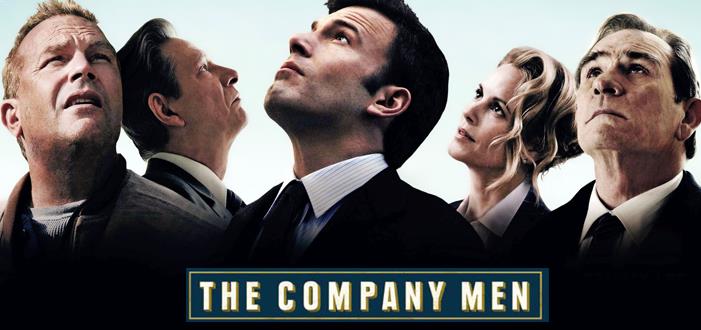
The Company Men
This is a terrific portrayal of working-class life. This seems befuddling on the surface, considering that the individuals impacted by the corporate shuffling and downsizing lead very affluent lifestyles, filled with Porsches and a plethora of kitchen appliances purchased from Bed Bath & Beyond and Crate & Barrel. But simply because the material prosperity exists, does not separate the lives of what amounts to as day-laborers.
These individuals impacted derive their sustenance for conspicuous skiing trips at Christmas and New England Patriots tickets by arriving at their job and doing their work. For which they are compensated generously. So when the gravy train stops because of very predictable reasons such as corporate gluttony which attenuates the growth of the corporation’s stock price, these individuals find their lifestyles immediately revoked. It causes a stark realization – a realization which may take days or months depending on the individual – that they leave their time with nothing but depreciating memorabilia that sit in the drive way with an expensive payment due on the 1st.
This is Marx’s proletariat which he championed so much. Of course, what Marx did not predict was that the prosperity of the industrial revolution would create a labor class so far removed from a notion of exploitation that they are resented by other laborers for their decadence. And yet all laborers share the same lack of desire to create an inheritance or legacy with their work. This is critical distinction between the bourgeois and the proletariat is on exciting display here.
Upper middle class is just an abbreviation of upper working class. While there are a selection of this affluent population that are self-made, and own what grants them their wealth, the majority are highly refined laborers, with the accompanying attitudes. As an example, taken with a comparison of a minimum wage earner at a fast-food chain, these laborers will vacate their positions at their current employers the moment a better – i.e. more lucrative – opportunity surfaces for them. This is not to say that an employee is obligated to have allegiance to their company, only that because they do not possess any ownership of their creation, they are more cavalier in their decision-making in regards to the investment of their time at their employer. This is seldom overlooked when portraying, such as in this film, the ostensible heartlessness of a conglomerate who eviscerates a laborer who has been employed at the company for over 30 years. In other words, it is a two-way street, as the film commonly shows how the upper working class views their occupations and their time being gainfully employed.
Grade: B+
(There also is a great depiction of love conquering will-to-power once more, displayed between the two founders of the business.)

